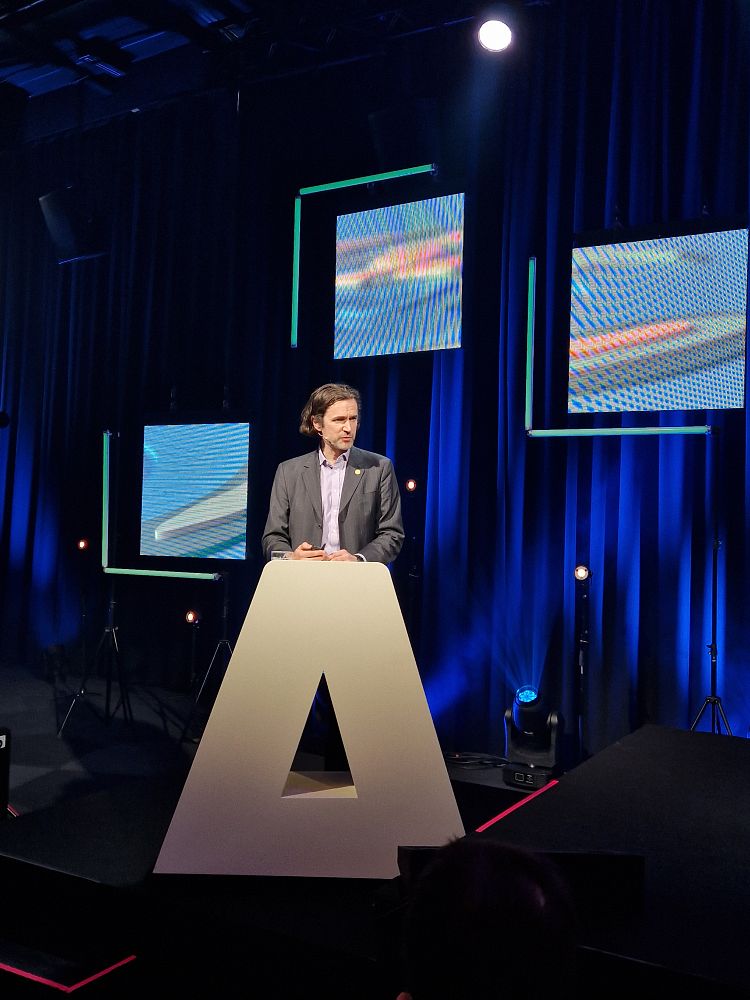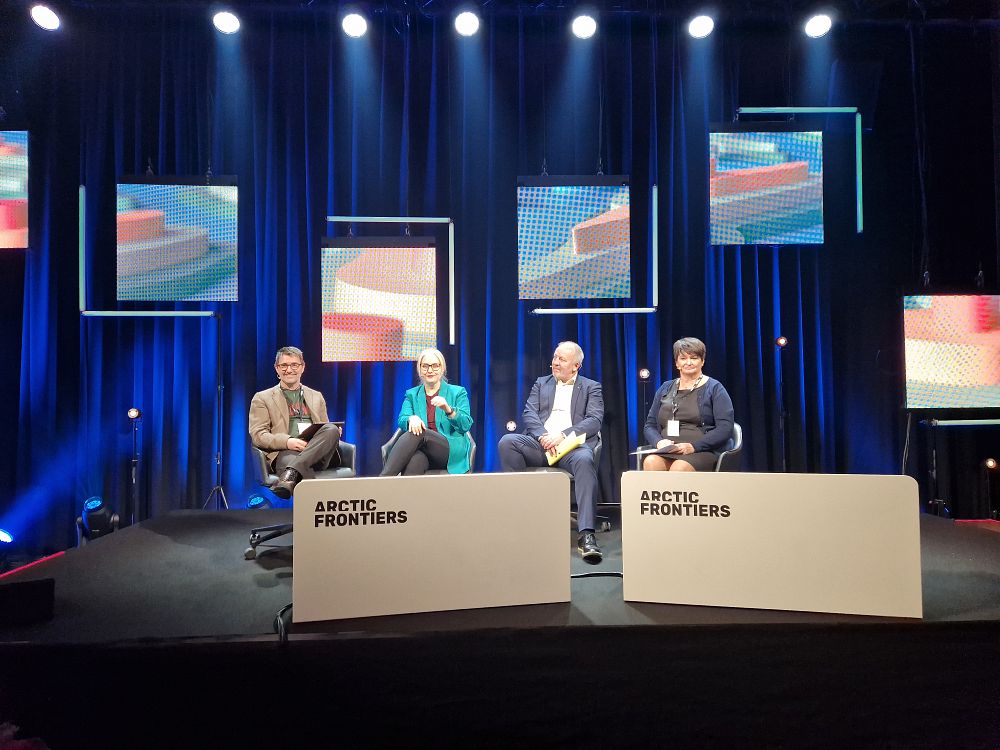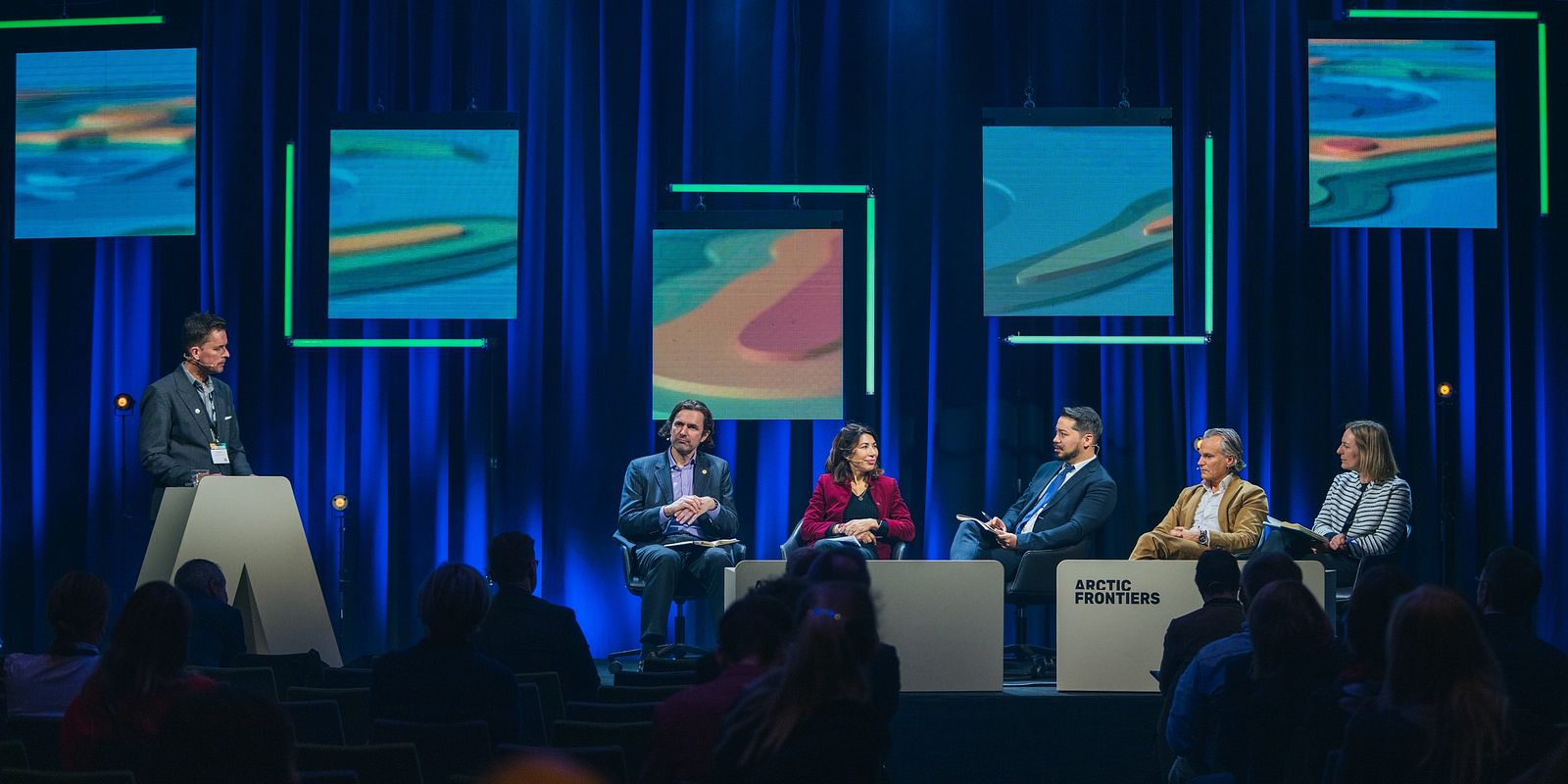7 February 2025 news
In the side event “License to Operate – The Arctic Energy Transition” at Arctic Frontiers 2025, stakeholders from across sectors joined forces to discuss the challenges lying ahead for the Arctic and the green transition of energy markets in a geopolitically challenging situation.
By Sverre Ole Drønen, UiB
The global energy transition is ongoing, but time is short, and stakes are high. Through The Green Deal and REPowerEU, the European Union seeks a rapid transition to green energy for European businesses and societies. In the side event the challenges in an Arctic perspective were discussed, asking: What will it take to realize the energy transition in the Arctic? Is there a “license to operate” for this to succeed?
In the opening presentation Professor Endre Tvinnereim from the University of Bergen presented facts and figures from the Norwegian Citizen Panel. The panel has been in operation since 2014, investigating trends in Norwegian public opinion on energy related issues.
“What do Norwegians think are reasonable and suitable ways for the energy transition? This is a systemic type of transition and in our surveys, we study how the opinion to this transition has changed over time. We find, amongst others, that the market-based electricity prices in Norway results in the public being more negative to the transition,” said Tvinnereim.

Endre Tvinnereim (UiB) (Photo: Trude Borch/Akvaplan-niva).
This event had two panels that was both moderated by Professor Tor Eldevik from the University of Bergen. In the first panel he was joined by Political Editor of newspaper Nordlys, Maja Sojtaric, Mayor of Karlsøy Municipality Mona Benjaminsen, Mayor of Senja Municipality Geir Inge Sivertsen, and Professor at UiT – The Arctic University of Norway. Torjer Andreas Olsen.
“The findings from the Norwegian Citizen Panel take in topics of public acceptance, acceptable use of nature, sustainable business model, competing interests, and more,” said Eldevik before asking the panel one question for all of them to respond to: “You are all in public positions one way or another, where you need to both consider facts and communicate this. What is your role in this and in the energy transition?”
“One of our main tasks is to get the competence and knowledge out there, because we are the ones who are having meetings with local residents. We must make sure that we create areas to meet local people, so that we know what their concerns are,” said Mayor Benjaminsen of Karlsøy.
“For us the space or area needed to both develop our fish industry and energy is a challenge. The problem is not the energy in itself but the transition and local and regional distribution, which is too weak to support the industry,” said her colleague Mayor Sivertsen from Senja, “We also face a very strong opposition with the majority of our inhabitants being strongly against wind power. That is a problem. We would like to produce more energy in my municipality. I try to tell people that we cannot only demand that others produce the energy we need, that we also need to contribute ourselves.”
Bringing in a media perspective, Political Editor Sojtaric of Nordlys underlined the role of the media not to shy away from conflicts.
“We need an open debate about the conflicts on energy-related issues. In Norway it’s complicated for many reasons. In Norway we have this tendency to be surprised by counter-movements, which is strange, because we have this all the time. Counter-movements will happen. Our job as a newspaper is to shed some light on the clashes that do happen. But also, to provoke this debate. We cannot shy away from this or hide it and hope it goes away,” she said.
“For UiT this is an important topic as we house a lot of resources, and we work to include indigenous perspectives. How we deal with this is a reason to worry. We need to find new ways of sharing and creating dialogue. To find ways of getting knowledge out of dialogue,” said Professor Olsen who ended by asking three key questions he’d picked up from a colleague from New Zealand, which faces similar challenges: “We should always ask: Who makes the decisions? Who benefits? Who decides who benefits?”

From left to right: UiT Professor Torjer A. Olsen, Political Editor Nordlys Maja Sojtaric, Mayor Senja Municipality Geir-Inge Sivertsen, Mayor Karlsøy Municipality Mona Benjaminsen (Photo: Trude Borch/Akvaplan-niva).
In the second panel moderator Eldevik was joined by Chair of the Arctic Economic Council and International Adviser for the Norwegian Shipowners’ Association, Kai Simon Eikli Yuen, Senior VP for Climate and Sustainability at Equinor, Hilde Røed, CEO at Nordkraft, Eirik Frantzen, EU Special Envoy for Arctic Matters, Claude Véron-Réville, as well as opening speaker, Endre Tvinnereim from UiB.
Tor Eldevik reiterated the question he’d asked the previous panel on their role in considering facts and communicating around the energy transition.
“There needs to be a motivation for change. There is an urgency, but I try to get some balance into this when motivating our employees for this transition. We’re in this together, said Røed of Equinor underlining that being fact-based and transparent is key: “We need to be open about our role in this, facing the challenges and dilemmas – or trilemmas as we call them. Why do things take time? Affordability of energy? Reducing emissions at the same time? Not just have a discussion of emission quotas. Trying to be transparent and honest.”
Commenting on Tvinnereim’s opening presentation, she added: “Everyone wants the green transition, but preferably not in their own backyard. Very recognizable and also very understandable.”
“We export 50 % of what we produce in the north. One of the big things for the northern part of Norway. We need to create a green industry based on renewable energy,” said Frantzen of Nordkraft.
“We need to balance the imperatives of the green transition, creating jobs, local communities, and rights of indigenous peoples. License to operate must be there from the beginning. Create understanding through dialogue. Try to include everyone and get our business model built on this,” said Eikli Yuen.
“I’ve listened carefully to the dialogue in this side-event from my EU perspective. It’s impressive. Thoughtful. Lots of empathy and humour. What about action? Action is license to operate. Balance and complementarity. If you want better balance, you better have two legs. Two legs of our EU legislation, we started with the Green Deal. Now we’re on the Clean Energy Deal. It’s extremely complex. Should we go faster on licenses? Should we review our state aid act to make it more adjustable to this new market? Should we open the market, protect the market?” said Véron-Réville.
To wrap up the session moderator Eldevik asked the panel to name the key priorities to succeed with the green energy transition.
“We need to pay for the nature that we consume, and we need to compensate within countries for redistribution,” said Tvinnereim.
“Just and fair transition. Preparedness, we’re all in risk of being complacent. Dialogue and integration,” said Véron-Réville.
“Consumer prices. Electricity demands we have in the future. In maritime space look at different industries in conjunction. Can be conflict. More holistic approach there,” Eikli Yuen.
“Decentralised models, with short way between production and use. Increased local acceptance. Grids, solve the bottlenecks in infrastructure,” said Frantzen.
“Enforce why transition is needed. That status quo is not an option. Very much about the processes and meaningful way of having engagement. Avoid the polarized debate that tends to come up with these kinds of things,” said Røed.
The side event was co-organised by Akvaplan-niva, Troms Kraft Vind and the University of Bergen.
RECORDING OF THE EVENT: https://www.youtube.com/live/XnYFKT2WYjI?feature=shared



